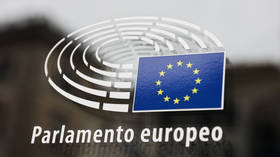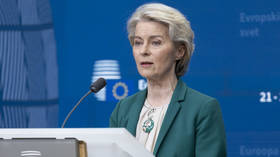Ukraine’s defeat may help EU establishment – researcher

With polls showing ‘nationalist’ parties surging in popularity ahead of the upcoming European Parliament election, Kiev’s worsening situation could prove useful to the bloc’s powers that be, according to a new book by French investigative journalist Charles Sapin.
Most of the EU has been outspoken in supporting the Ukrainian government in the conflict with Russia, sending an estimated €77 billion ($83 billion) worth of weapons, equipment, ammunition and even cash to Kiev. Sapin’s analysis, however, implies that bad news from the battlefield could bolster the European People’s Party (EPP) and the second-largest group, the Progressive Alliance of Socialists and Democrats (S&D) in upcoming elections.
“If Ukraine’s position weakens, there may be a ‘rallying behind the flag effect’ more favorable to the forces in place,” he was quoted as saying by Politico EU on Monday.
Sapin is a reporter for the weekly Le Point who spent six years researching what he calls the “nationalist” parties that form the Identity and Democracy (ID) bloc in the European parliament – such as Hungary’s Fidesz, Portugal’s Chega, Spain’s Vox, France’s National Rally, Brothers of Italy and the Sweden Democrats. The final result was the book called ‘Les Moissons de la Colere’ (The Harvests of Wrath), presented as a deep dive into “nationalist Europe.”
One major weakness of the parties in the ID grouping, according to Sapin, is that they have different opinions on the Ukraine conflict.
Nationalists’ numbers might be rising but they are “isolated” in Brussels because of their particularism, he contends. Their victories in the upcoming election would move the needle to the right, but to the benefit of the EPP, currently the majority group.
This may help explain why French President Emmanuel Macron brought up Ukraine at a recent brainstorming session about the upcoming elections. Amid the strategy discussions the French leader suddenly voiced a concern that Ukraine “could fall very quickly,” according to sources that spoke with Politico. He then set up a 'New Europeans' coalition, an alliance of liberal parties from France, Denmark, Poland, Romania and Slovenia.
Hungarian Prime Minister Viktor Orban – long the sole dissenter when it came to aiding Kiev – doubled down on calls for a ceasefire in Ukraine and a negotiated peace.
According to Sapin, parties like Orban’s have gained power thanks to semantic tricks and ideological acrobatics, converting “old bourgeois” voters by talking about immigration, identity and the environment and abandoning calls for leaving the EU. His book includes insights from both the closest political advisers to Orban, from Italian PM Giorgia Meloni and French presidential candidate Marine Le Pen – and from their political enemies.













